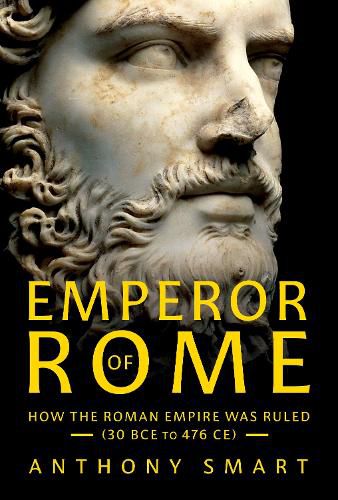Readings Newsletter
Become a Readings Member to make your shopping experience even easier.
Sign in or sign up for free!
You’re not far away from qualifying for FREE standard shipping within Australia
You’ve qualified for FREE standard shipping within Australia
The cart is loading…






When Theoderic the Great entered the city of Rome in 500, as an Ostrogothic king, the citizens in Rome could have been forgiven for thinking an Emperor had returned. Everything he did, from his journey, to his arrival, and actions in the city itself, were in imitation of Roman expressions of imperial power. The role of the Emperor, however, remains complex and multifaceted, and the very powers Theoderic was seeking to emulate had complex histories of their own. It was only when Augustus, Rome's first Emperor, died in 14 AD that Rome at last admitted the truth that a Princeps now ruled, where the Senate had once held power. Anthony Smart provides a new study of the Roman Emperor, from Augustus through the late fifth century AD, with interwoven studies on later medieval imperial rulers. The book is divided into three. The first section looks at sources (e.g. coins, speeches, histories). The second looks at themes (such as war, peace, religious unity and emotional control). The final section looks at specific examples of imperial power, and how these figures altered or modified the very nature of imperial rule. Throughout the book the author returns to the following questions: what did it mean to be an Emperor in this world? How did they govern? Were they proactive, or reactive? Is it right to say that an Emperor is what an Emperor does, or is the reality rather more complex than that? And crucially, who creates the image of the Emperor? The court, the senate, or the people of Rome? AUTHOR: Anthony Smart is an independent researcher based in the UK. A graduate of the University of York, he was previously Lecturer in Ancient and Medieval History at York St. John University, UK. A specialist in the history of Rome, with a particular interest in the political manifestation of emotion in the late Republic and early Principate, he has published on Greek, Roman and Anglo-Saxon history. He is an Associate Fellow of the Royal Historical Society, a member of Centre for the History of the Emotions at Queen Mary, and the Higher Education representative for the Classical Association's Ancient History Teaching Board. He is the author of Grief and Sorrow in the Roman World: Republic to Empire (Bloomsbury). 20 b/w illustrations
$9.00 standard shipping within Australia
FREE standard shipping within Australia for orders over $100.00
Express & International shipping calculated at checkout
Stock availability can be subject to change without notice. We recommend calling the shop or contacting our online team to check availability of low stock items. Please see our Shopping Online page for more details.
When Theoderic the Great entered the city of Rome in 500, as an Ostrogothic king, the citizens in Rome could have been forgiven for thinking an Emperor had returned. Everything he did, from his journey, to his arrival, and actions in the city itself, were in imitation of Roman expressions of imperial power. The role of the Emperor, however, remains complex and multifaceted, and the very powers Theoderic was seeking to emulate had complex histories of their own. It was only when Augustus, Rome's first Emperor, died in 14 AD that Rome at last admitted the truth that a Princeps now ruled, where the Senate had once held power. Anthony Smart provides a new study of the Roman Emperor, from Augustus through the late fifth century AD, with interwoven studies on later medieval imperial rulers. The book is divided into three. The first section looks at sources (e.g. coins, speeches, histories). The second looks at themes (such as war, peace, religious unity and emotional control). The final section looks at specific examples of imperial power, and how these figures altered or modified the very nature of imperial rule. Throughout the book the author returns to the following questions: what did it mean to be an Emperor in this world? How did they govern? Were they proactive, or reactive? Is it right to say that an Emperor is what an Emperor does, or is the reality rather more complex than that? And crucially, who creates the image of the Emperor? The court, the senate, or the people of Rome? AUTHOR: Anthony Smart is an independent researcher based in the UK. A graduate of the University of York, he was previously Lecturer in Ancient and Medieval History at York St. John University, UK. A specialist in the history of Rome, with a particular interest in the political manifestation of emotion in the late Republic and early Principate, he has published on Greek, Roman and Anglo-Saxon history. He is an Associate Fellow of the Royal Historical Society, a member of Centre for the History of the Emotions at Queen Mary, and the Higher Education representative for the Classical Association's Ancient History Teaching Board. He is the author of Grief and Sorrow in the Roman World: Republic to Empire (Bloomsbury). 20 b/w illustrations